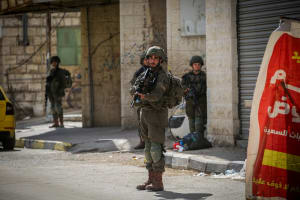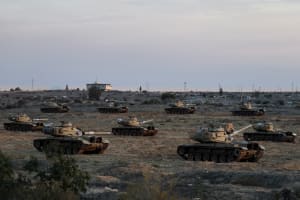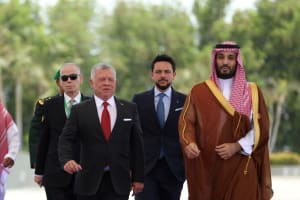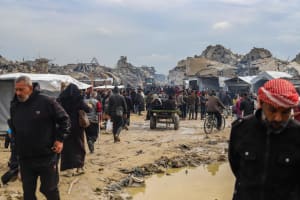Israel's military challenges: Now and beyond
Analyst says: “Israel has reached the moment of truth”
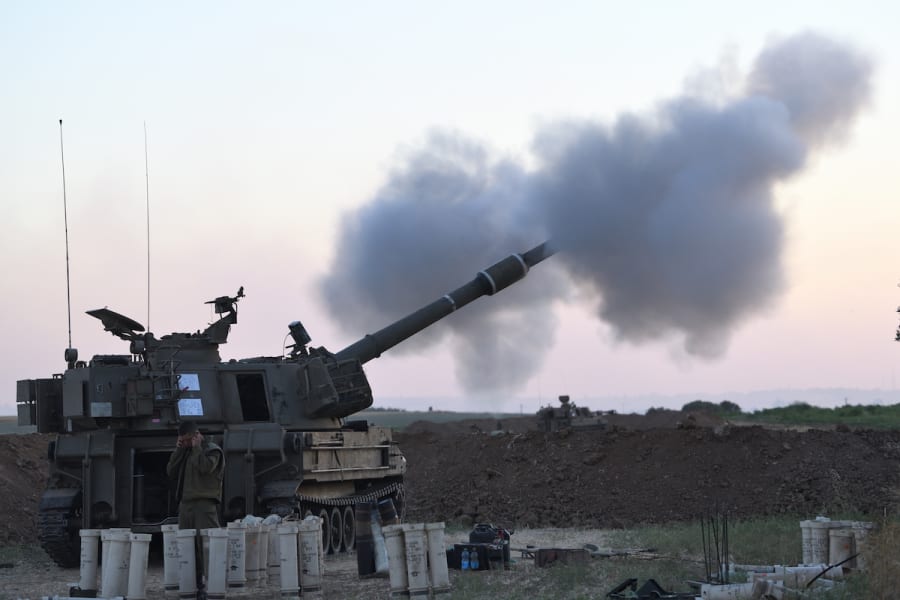
Hamas reportedly fired missiles from the Gaza Strip into the Mediterranean Sea on Monday – another signal to Israel and Egypt that its patience is wearing thin.
This also signals that Hamas feels confident enough to pressure Israel into making concessions, setting conditions and ultimatums. Both sides are negotiating an agreement, through Egyptian mediation, but Hamas thinks it has the upper hand.
Therefore, it is presenting a hard line in its demands of Israel.
On the Israeli home front, the Israel Defense Forces (IDF) has been grappling with more than 10,000 soldiers in quarantine due to the outbreak of the Omicron variant of COVID-19. Recently, separate military accidents have resulted in the deaths of two air force pilots and two IDF officers. There has also been an uptick in Palestinian violence. This comes on the heels of clashes with Hamas in late December and early January.
While Israel’s borders are currently quiet, major challenges lie ahead for the IDF. After the 11-day conflagration between Israel and Hamas in May, Hamas has been intent on expanding its capabilities to create more havoc and violence in Jerusalem, the West Bank and in Israel’s mixed cities of Jews and Arabs.
One of the key issues Israel faces today is Hamas’ determination to take over areas that the Palestinians now control in the West Bank.
Kobi Michael, a senior research fellow at INSS, said part of Hamas’ political struggle and end-game strategy is to humiliate the Palestinian Authority (PA) and Fatah. One of the main purposes of Hamas, in its last confrontation with Israel, was to score points among the Palestinians, strengthening its strategic position. It also wanted to strengthen its military position regarding Israel.
“Hamas feels it succeeded in this operation. I think they are right,” he acknowledged.
According to Michael, Hamas leaders have set different rules of the game and are using a DRS (Dual Resistance Strategy).
“The sense of this strategy is that they keep quiet in the Gaza Strip; but seek all possible efforts to improve and strengthen their terror infrastructures in the West Bank and in South Lebanon; while also broadening their channels with the Arab citizens of Israel,” Michael said.
One Hamas tactic is to use terror attacks to undermine and weaken the stability of the Palestinian Authority. Michael explained that this leads to increased friction and clashes between Israel and the local Palestinian population. In addition, Hamas is building greater military capabilities in Lebanon in full coordination with Hezbollah and Iran. In the next round of clashes with Israel, Hamas intends to operate on all these fronts, simultaneously, as it did in the last confrontation.
Another goal of Hamas is to improve conditions in the Gaza Strip, to increase its popularity and legitimacy among potential supporters in the international arena. It is using this time of calm to build up and improve its advanced weapons systems.
Why is Israel allowing this? Michael is unsure but said, “I don’t think we need to cooperate with this Dual Resistance Strategy.”
Michael explained that there is no distinction between the political and military wings of Hamas, and no distinction between Hamas in the West Bank and in Gaza. Furthermore, there should be no distinction between Hamas in South Lebanon or elsewhere.
“From the Israeli perspective, if there is a terror attack by Hamas in the West Bank, in Israeli eyes, it should be interpreted as a terror attack from the Gaza Strip,” he said. “Hamas leadership in Gaza is deeply involved in all the terror attacks in the West Bank. They are also deeply involved in all the preparations in South Lebanon, and of course, all the efforts regarding the Arab citizens of Israel.”
The IDF must seriously consider any military actions by Hamas as a threat, including its recent joint exercises with terror groups in Gaza, which the Palestinian Islamic Jihad joined.
Michael pointed out that this is not just propaganda as some may think: “They really prepared themselves. They built more sophisticated capacities to be in a better position for the next round with Israel. It will come. I have no doubt about it.”
As Michael sees it, if the Dual Resistance Strategy continues, a military confrontation “will be in the timing that Hamas has set, and not in the timing Israel has set. It will be the most inappropriate time for Israel.”
According to Michael, Israel views its main challenge not as Hamas but Iran, Syria and Hezbollah. This may be why Israel is not currently initiating defense operations against the infrastructure of Hamas militants, in order to humiliate them and destroy their capabilities.
“Hamas without its military capabilities will be much weaker than today; and the question should be why we are willing to accept and cooperate with this dual strategy when Hamas is not our partner for any negotiations?”
He believes Israel should act now to prevent Hamas from striking Israeli territory when it wants to. Michael cannot predict when the next war will take place, but assessed that if Israel does not change its strategy, it will find itself in a much more complicated military operation than before, resulting in a huge headache for Israel.
With each round of clashes, Hamas develops more know-how and more confidence. While using Gaza citizens as human shields, Hamas launches rockets on Israeli territory. In addition, Hamas violates international laws, while complaining that Israel is doing this. They also have no problem manipulating the international media.
Michael expects that in a future confrontation with Israel, Hamas will challenge Israel’s Iron Dome system by firing more quantities of rockets in one launch. Hamas is also expected to use drones, UAV’s and cyber capabilities.
Iran is also providing Hamas with knowledge and arms. Although there is a security closure around the Gaza Strip, Hamas still succeeds, from time to time, to smuggle in weapons.
Michael stated that the knowledge gained from Iran, along with the weapons smuggling, has resulted in an upgrade of military expertise for Hamas. Yet, the current Israeli policy is still to keep things calm.
“The Israeli leadership wants to have silence,” Michael said. “They believe they can buy the silence for a long period of time. I believe that the price that we are paying for this silence is too high, from a strategic perspective, and that it is much higher than we think.”
Michael added that Israel wants to use the silence to prepare for the greater challenge to the IDF’s capabilities on the northern front. There are other reasons why Israel may be holding back a pre-emptive strike.
“Maybe, Israeli leadership thinks that it will damage the Abrahamic Accords, and the normalization process with the Arab countries,” he speculated.
While Israeli leaders look to the United States, they realize they do not always have the backing of the American administration. Israel might find itself under future international pressures, where the U.S. might not defend the Jewish state.
Michael explained that America could, someday, join the international community that adds its own pressures on Israel.
“I think all of these reasons and calculations brings the Israeli leadership to a decision to prefer to reach an agreement with Hamas and cooperate with the dual strategy,” he said.
Michael fears that if Hamas leaders conclude that they are facing a stalemate in their negotiations with Israel, the group will instigate a confrontation on Israel’s southern border.
The warning on Monday, confirms this theory, along with two incidents in December and January – a sniper shooting at Israeli workers on Israel’s border with Gaza and rockets fired at the coast of Tel Aviv.
Meanwhile, Israel is preparing for a full-scale war with Iran and its proxies. Directed by Iran, and in cooperation with Hezbollah, Hamas is entrenching itself on Israel’s northern border. Iran is preparing Hamas to be the first line of defense in southern Lebanon against Israel in the next major conflict.
Michael concluded that Israel will have to calculate its steps very cautiously. It is his strategic assessment that Israel’s political echelon should re-evaluate its current policy. The IDF should be able to act, in a proper and suitable time, that is advantageous for Israel and not for Israel’s enemies.
Considering that Hamas is in a better strategic position now with its advanced military capacities – able to hit Israel from both the country’s southern and northern borders – Michael believes Israel must do something to change the situation.
“Israel has reached its moment of truth,” he said.

Carrie Hart is a news analyst reporting on political, diplomatic, military and social issues as they relate to Israel, the Middle East, and the international community.




